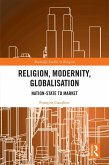The book's analysis rests on three foundational arguments. First and most fundamentally, it is impossible to understand movements for social change without analyzing the multiple ways that religion shapes their ideas, communities, and practices.
Second, religion is always in mutually transformative interaction with social and political forces and can never be entirely separated from them. In social movements and in the public sphere more generally, people interpret politics with values and concepts drawn from religion and understand their activism as spiritually meaningful. This challenges the assumption that religion is a largely a private matter.
Third, scholars must treat religion as a relatively independent variable, which actively shapes social processes just as it is shaped by them. We cannot make sense of religion's role in social movements without acknowledging that religious institutions and traditions have, to some extent, a life of their own.
Dieser Download kann aus rechtlichen Gründen nur mit Rechnungsadresse in A, B, BG, CY, CZ, D, DK, EW, E, FIN, F, GR, HR, H, IRL, I, LT, L, LR, M, NL, PL, P, R, S, SLO, SK ausgeliefert werden.
Richard L. Wood, president of the Institute for Advanced Catholic Studies at the University of Southern California and professor of sociology at the University of New Mexico









